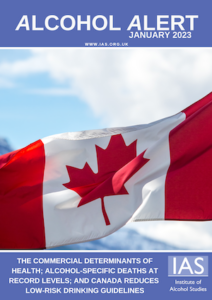In this month’s alert
What are the commercial determinants of health? Podcast feature
The phrase ‘commercial determinants of health’ is being increasingly used in the public health sphere. But what does it mean, how does it relate to the alcohol industry, and what should our listeners reflect on?
We spoke to Jeff Collin, Professor of Global Health Policy at the University of Edinburgh, about the issue.
Alcohol-specific deaths at record levels
In 2021, there were 9,641 deaths from alcohol-specific causes in the UK, a rise of 7.4% on the previous year, and 27.4% higher than in 2019, according to ONS figures released in early December. These are the highest levels ever recorded.
Alcohol-specific deaths are those which are wholly attributable to alcohol, such as liver cirrhosis.
Rates between 2012-2019 had been relatively stable, leading to ONS’s James Tucker commenting that:
“This rise is likely to be the result of increased alcohol consumption during the pandemic. People who were already drinking at higher levels before the pandemic were the most likely to have increased their alcohol consumption.”
Alcohol-specific death rates per 100,000 people by sex
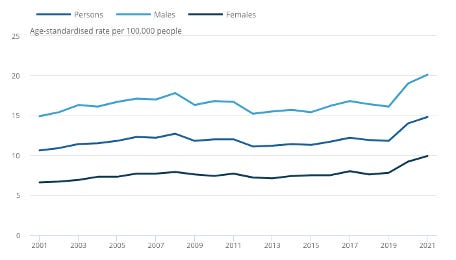
IAS’s chief executive Dr Katherine Severi said:
“Evidence from home and abroad shows fiscal measures are the most effective tools to tackle alcohol harm and reduce inequalities. The UK government has committed to reforming alcohol duty to better protect public health and today’s data add urgency to these plans.
“Despite opposition from commercial interests, we can’t afford to delay or dilute policies that help save lives.”
Professor Sir Ian Gilmore said it was a “national tragedy… with every life lost leaving behind a devastating impact on families, friends, and communities. It is all too clear that we are amidst a public health crisis, and urgent action is needed to address these levels of harm.”
In January the BBC reported that the number of people in alcohol treatment increased by 10% in the year to March 2022, due to this rise in harmful drinking during lockdown.
This means treatment for all types of substance use are at a seven year high of 289,215.
Nat Travis, national head of substance misuse at charity Turning Point, said they saw “a significant increase in the number of alcohol referrals” during lockdown.
Scottish marketing consultation: Prohibitionist madness or ambitious and freeing?
Since the Scottish Government announced it is consulting on restricting alcohol marketing, the alcohol industry response has been highly critical.

As the consultation states, it “sets out a range of potential proposals including prohibiting alcohol advertising in outdoor public spaces, phasing out alcohol sponsorship and reducing the promotion of alcohol in-store.” The ultimate aim is to reduce the appeal of alcohol to young people.
In the Scotsman, Dr MacGilchrist of SHAAP responded to criticism, writing that “99% of whisky produced in Scotland is exported to countries which would be unaffected by these restrictions”.
MacGilchrist argues that Scotland should be:
“ambitious and try to shape a society where alcohol is no longer a constant in our lives. Let’s seize the opportunity of the Scottish Government’s proposed marketing restrictions and put health and well-being of future generations ahead of corporate interests.”
Discussing the industry criticism that these restrictions inhibit consumers’ ability to make informed choices, IAS’s Jem Roberts writes that: “as a moderate drinker, I find that both offensive and extremely patronising, as if I need alcohol advertising in my life to help me make decisions about what to drink.”
“The whole point of advertising campaigns is to influence consumer behaviour, and we rarely get to choose not to see it when it’s plastered across billboards and on every ad break at the World Cup.
“In this way, alcohol advertising can act to restrict and remove our choice by targeting and influencing drinkers, and future drinkers such as children. A ban on alcohol advertising would increase freedom of choice for drinkers.”
In related news, a paper that accompanies the consultation states that “without branding and other marketing strategies, alcohol products in each beverage sub-sector are essentially variations of the same thing.”
This statement led to furious backlash by many industry figures, including whisky consultant and broker Blair Bowman, who said:
“In one sentence, they’ve dismissed centuries of heritage and culture. Scotch whisky is our biggest food and drink export. It’s madness. They don’t even understand the product. What makes it so special is the uniqueness of every single diverse style of distillery.”
Canada reduces low-risk drinking guidelines due to cancer risk
In mid-January, the Canadian Centre on Substance Use and Addiction (CCSA) published its report Canada’s Guidance on Alcohol and Health, which gives information about the risk of harms associated with alcohol consumption.
The report includes recommended guidelines for low-risk consumption, which numerous Canadian and international newspaper articles focused on. The report explains that due to a better understanding of alcohol harm over the past decade – including research that shows that alcohol causes cancer even when drinking low amounts – we now know that the risk of harm exists on a continuum.
In the BBC, Erin Hobin, one of the members of the expert panel that developed the guidelines, said:
“The main message from this new guidance is that any amount of alcohol is not good for your health. And if you drink, less is better.”
Continuum of risk associated with average weekly alcohol consumption
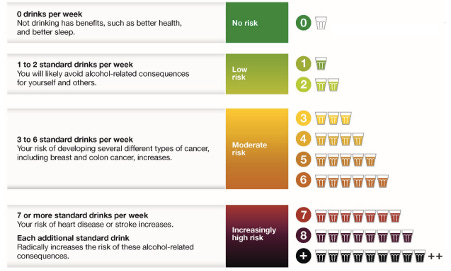
Canada’s new weekly low-risk guideline of two standard drinks is equal to 3.4 UK units, and their ‘moderate risk’ maximum of six standard drinks is equal to 10 UK units.
The report goes on to say that mandatory labelling of all alcohol products with health warnings is a necessary next step, to help people be informed of the risks.
“People have the right to know,” said CCSA CEO Dr Alexander Caudarella. “It doesn’t mean that they’re going to eliminate the risk entirely, it just means that … they have a right to make informed and free decisions.”
In The Guardian article on the topic, one of the CCSA’s panel members, Peter Butt, said: “This isn’t about prohibition. This is simply about reducing the amount one drinks. It’s fundamentally based on the right to know.”
Dr Katherine Severi said the new guidelines “may seem very low and unnecessarily strict, but it is simply an assessment of the best quality evidence…. No one is being forced to drink differently. The guidelines make it clear that it is simply about people’s right to know the risk of harm.”
The dangerous conflict of interest of the THINK! campaign
In the lead up to Christmas, the Government road safety campaign THINK! once again partnered with the alcohol giant Diageo.
The campaign was aimed at young men and stated, “a mate doesn’t let a mate drink drive”. It specifically partners with Captain Morgan and Guinness, including advertising for the 0.0% version.
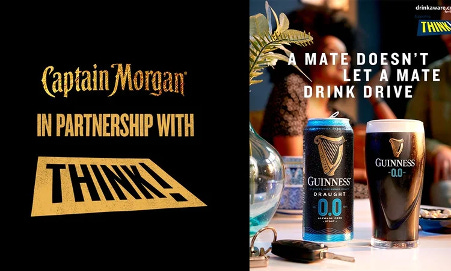
Advertising content drove traffic to the ‘Wrong Side of the Road’ tool, where people can learn the consequences of drink driving.
In December, IAS published a blog by Colin Shevills, former Director of Balance and Special Adviser to the AHA, who wrote:
“Just think about that for a moment. The Government partnering with Guinness and Captain Morgan to tackle drink driving.
“The campaign reminds them that ‘a mate doesn’t let a mate drink drive’. In other words, drink driving is the problem of the individual drinker and their friends, not the company spending millions to promote their health-damaging products. It convinces Governments that alcohol companies are part of the solution to alcohol harm, not the cause of the problem.”
Labour MP Barry Sheerman asked the Government if the Department for Transport had made an assessment of potential conflicts of interest relating to the partnership. Transport Minister Richard Holden responded:
“THINK! and Diageo have entered into a no-cost partnership to tackle drink driving over the festive period, following a successful partnership in winter 2021.
“THINK! assessed that there would be no conflict of interest in this partnership due to its no-cost and educational nature.”
Ireland’s health warning labels are a “direct attack” against Italy, claims trade group
Ireland is slowly moving towards implementing mandatory health warnings on products (see graphic for what these would look like), as part of its Public Health (Alcohol) Bill. Alcohol lobbyists have called on the European Commission to prevent this, arguing that it would breach EU single market rules.
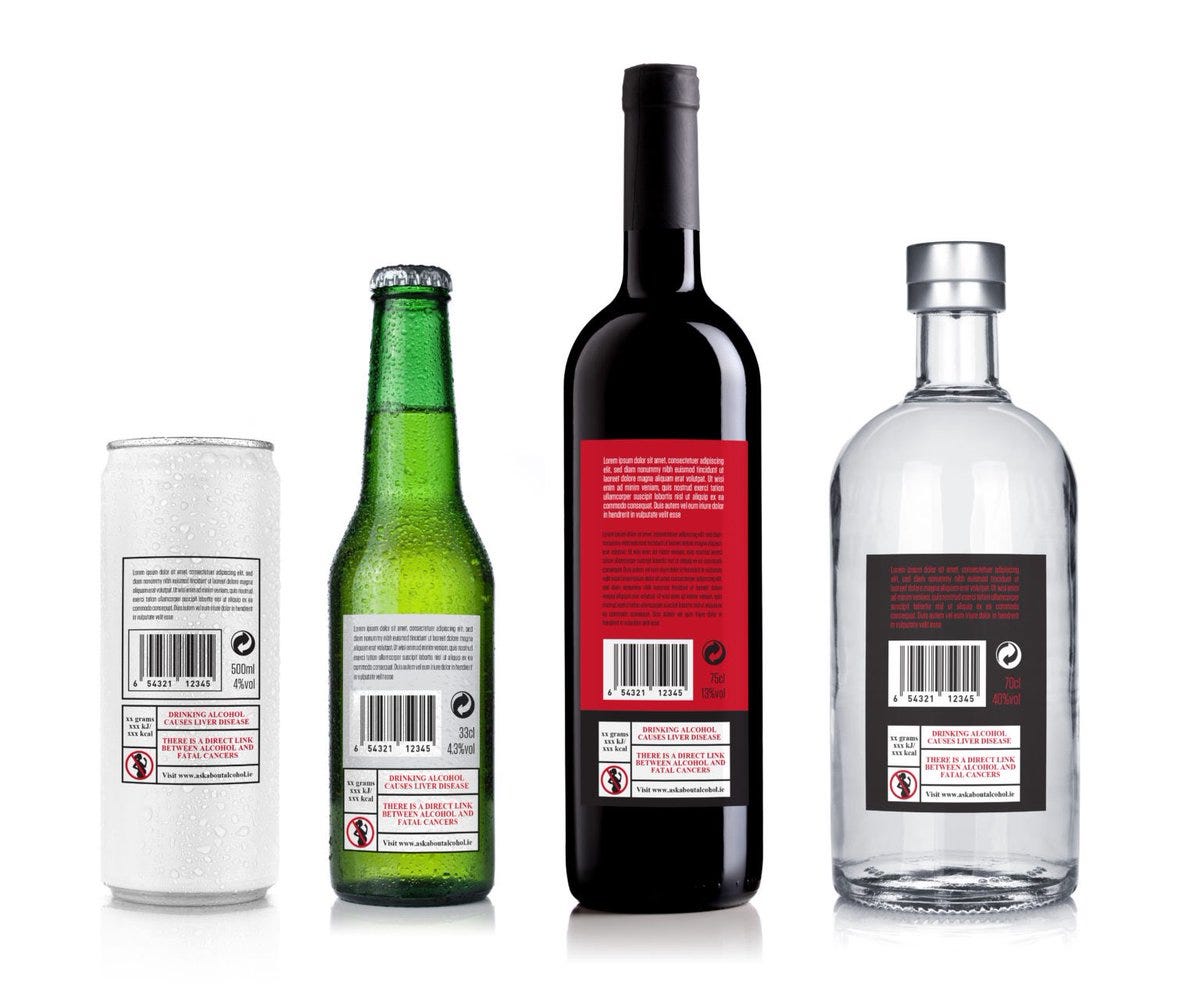
Ireland informed the Commission of its plan last June and did not receive an objection from the body during a six-month moratorium period, despite protests from Italy, Spain and six other EU member states.
Drinks Ireland said the additional costs associated with labelling products could hinder trade. The Federation of the Brewing and Soft Drinks Industry in Finland said it could undermine EU plans on promoting alcohol and be a barrier to trade.
Spirits Canada said it is misleading to have health warnings regarding cancer because “Alcohol may contribute to, but cannot be said to cause, cancers”, despite the abundance of evidence of a causal link.
The Guardian published an article that quoted Coldiretti, Italy’s biggest farmers’ association, who described the “terrifying” warnings as a “direct attack” against the country:
“It is completely improper to equate the excessive consumption of spirits, typical of the Nordic countries, to the moderate and conscious consumption of quality products with lower alcohol content, such as beer and wine.”
Dr Sheila Gilheany of Alcohol Action Ireland told The Irish Times that the industry response has been “somewhat hysterical” and that:
“The regulations are modest measures giving details of calories, alcohol content, warnings about drinking in pregnancy, facts about cancer and liver disease, plus a link to a Government public health website.”
In an IAS blog Dr Gilheany explains what has happened so far.
Italy’s foreign minister and deputy prime minister Antonia Tajani spoke to Ireland’s Tánaiste and Minister for Foreign Affairs Micheál Martin, and said that he:
“reiterated that a glass of red wine, all the doctors say it is also good for the heart, so it is doubtful that it can also be bad for you. I believe the commission should intervene and bring the rules of a country back in line with the rules of the single market.”
Dr Catherine Conlon, of Trinity College Dublin, wrote in the Irish Examiner:
“Ireland can take pride in once again leading the way in public health by setting a template for other countries across the globe to follow suit.”
Artificial Intelligence (AI) age identifier trial successful
The Home Office has successfully trialled AI technology to accurately identify the age of shoppers, according to The Telegraph.
The tech uses a camera that scans people’s faces and estimates their age.
Tesco, Asda, Morrisons and Co-op took part in the trials with the facial technology firm Yoti, through which anyone judged to be over 25 was allowed to continue to buy their alcohol without any further checks. Those assessed to be under 25 had to show ID.
According to the trial results, no underage customers purchased age restricted items when using the age verification technology, and supermarkets said they would support a change in the law.
The trial also saw pilots of digital ID cards for young people to verify their age to go to clubs, pubs and night clubs, which cut the time of checking from 14.8 to 4.7 seconds.
The failures of the 2012 Alcohol Strategy
Labour MP Dan Carden brought a debate to the Houses of Parliament to discuss the failures of the 2012 Alcohol Strategy. He said that 10 years on, alcohol harm has increased and we’re at crisis point.
He discusses what was scrapped or reneged on:
Carden went on to highlight why he thinks it was scrapped:
Minister for Crime, Policing and Fire, Chris Philp, responded that many measures of the 2012 Strategy were taken forward, such as the Late-Night Levy, strengthening licensing conditions, and creating more powers to deal with problem premises.
He said the Government will study Scotland’s report on minimum unit pricing extremely carefully, and if there is evidence of effectiveness “we stand ready to respond to it”.
Read Dan Carden’s piece in The House on the topic
Alcohol Toolkit Study: update
The monthly data collected is from English households and began in March 2014. Each month involves a new representative sample of approximately 1,700 adults aged 16 and over.
See more data on the project website here.
Prevalence of increasing and higher risk drinking (AUDIT-C)
Increasing and higher risk drinking defined as those scoring >4 AUDIT-C. A-C1: Professional to clerical occupation C2-E: Manual occupation
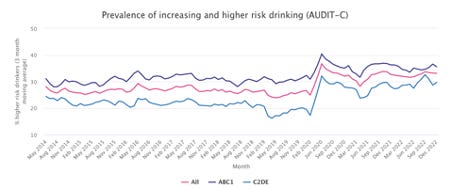
Currently trying to restrict consumption
A-C1: Professional to clerical occupation C2-E: Manual occupation; Question: Are you currently trying to restrict your alcohol consumption e.g. by drinking less, choosing lower strength alcohol or using smaller glasses? Are you currently trying to restrict your alcohol consumption e.g. by drinking less, choosing lower strength alcohol or using smaller glasses?
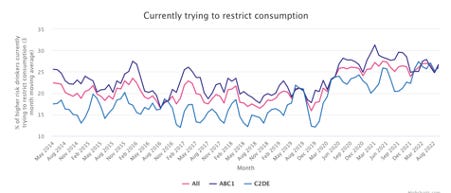
Serious past-year attempts to cut down or stop
Question 1: How many attempts to restrict your alcohol consumption have you made in the last 12 months (e.g. by drinking less, choosing lower strength alcohol or using smaller glasses)? Please include all attempts you have made in the last 12 months, whether or not they were successful, AND any attempt that you are currently making. Q2: During your most recent attempt to restrict your alcohol consumption, was it a serious attempt to cut down on your drinking permanently? A-C1: Professional to clerical occupation C2-E: Manual occupation
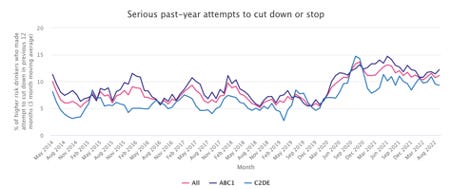
Podcast
Our monthly podcast features interviews with experts from across the sector.
Gambling industry harms and parallels with the alcohol world
Will Prochaska –
Coalition to End Gambling Ads

